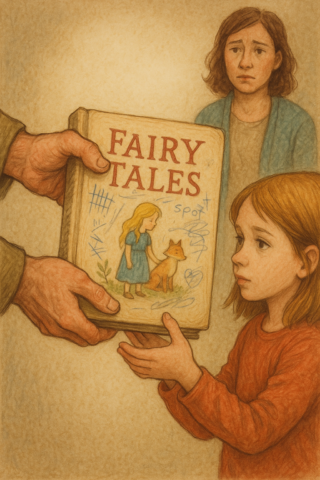The chapel was filled with lilies—my mother’s favorite. The scent clung to the air, mingling with soft piano notes and the quiet sobs of those who had loved her. I stood near the front, numb, holding the edges of the photo collage I’d pieced together the night before. Smiling pictures of her at every stage: young, wild-haired, holding me in her arms, dancing in the kitchen, baking cookies at Christmas.
But I couldn’t focus. My mind was still spinning from how fast everything had happened. Mom had passed away just three days earlier after a sudden stroke. There had been no time for proper goodbyes—just a final whispered “I love you” as I held her hand in the hospital.
That’s when I noticed him—a man in a charcoal suit standing alone at the back of the chapel.
He wasn’t someone I recognized. Not from church. Not from the neighborhood. Not from any of Mom’s work events or bridge clubs. He didn’t seem to know anyone else either. Still, he stood respectfully, hands folded, head slightly bowed.
I caught glimpses of him throughout the service. When the time came for anyone to share a memory, he didn’t step forward. But when the service ended and mourners slowly filtered out, he lingered. As I received condolences, I saw him approach, hat in hand.
“Are you Emily?” he asked softly.
“Yes,” I said, searching his face for some clue. He was in his sixti es, with gentle eyes and a kind, weathered expression.
es, with gentle eyes and a kind, weathered expression.
“My name is Thomas.” He looked down, then back up with emotion glistening in his eyes. “I knew your mother… a long time ago.”
“How did you know her?” I asked, surprised but curious. Something about his presence didn’t feel intrusive—just… heavy, as though he had carried something for a very long time.
He nodded toward a nearby bench just outside the chapel. “Would you mind if we sat for a moment? There’s something I believe you should know.”
I hesitated, then followed. We sat under the shade of an old oak tree, its branches swaying gently in the summer breeze.
“Your mother was 22 when I met her,” he began. “It was 1978. I had just returned from overseas, trying to find my footing again in civilian life. I was lost, angry, and broke. One night, I collapsed near a diner on the outskirts of Dayton. Your mother worked there.”
I blinked. I had never heard of this time in her life.
“She didn’t know me. But she helped me. Brought me food. Let me sit in the back and rest. For days. She said I reminded her of someone she once knew, but I think she just had a kind soul.”
“She always did,” I whispered.
He nodded, smiling faintly. “Over time, we became close. We weren’t a couple. Not quite. But we were more than friends. I was in a dark place, and she brought light into it. But I wasn’t ready. I left without saying goodbye, and I regretted it every day.”
I felt a lump in my throat. “Why are you telling me this now?”
He reached into his coat pocket and pulled out a weathered envelope. “Because your mother kept writing to me. For years. I never wrote back. I felt I didn’t deserve her forgiveness. But I read every word.”
My hands shook slightly as I took the envelope. Inside were several folded letters, yellowed with age and worn at the edges. My mother’s handwriting stared back at me—familiar and achingly alive.
“She wrote about you,” he continued. “About your father. About how you were growing up. She never stopped loving you. And… she never stopped forgiving me.”
I looked at him, tears pooling. “She never told me any of this.”
He smiled, eyes misty. “Because she never wanted to burden you with her past. That was your mother—always choosing to protect others’ hearts over her own.”
We sat in silence for a long while. I felt like I was seeing my mother through a new lens—one of complexity, grace, and quiet strength I had always sensed but never fully understood.
Before he left, Thomas placed something else in my hand. A small, silver locket.
“She asked me to give this to you someday, if I ever found the courage. It was her mother’s. She said you’d know what to do with it.”
I opened it slowly. Inside was a tiny photo—me as a baby in her arms on one side, and on the other, a pressed wildflower. I remembered asking her once what kind of flower that was. She said, “It’s a forget-me-not.”
Final Thought:
Sometimes, we believe we know everything about the people we love. But every life holds unspoken chapters—acts of quiet bravery, sacrifice, and love that shape the soul without needing to be seen. My mother didn’t just teach me how to live—she showed me, even after her passing, the depth of the human heart. And in that moment, with a stranger beside me and the summer wind in the trees, I realized: some stories are meant to find us when we’re ready to hear them.



